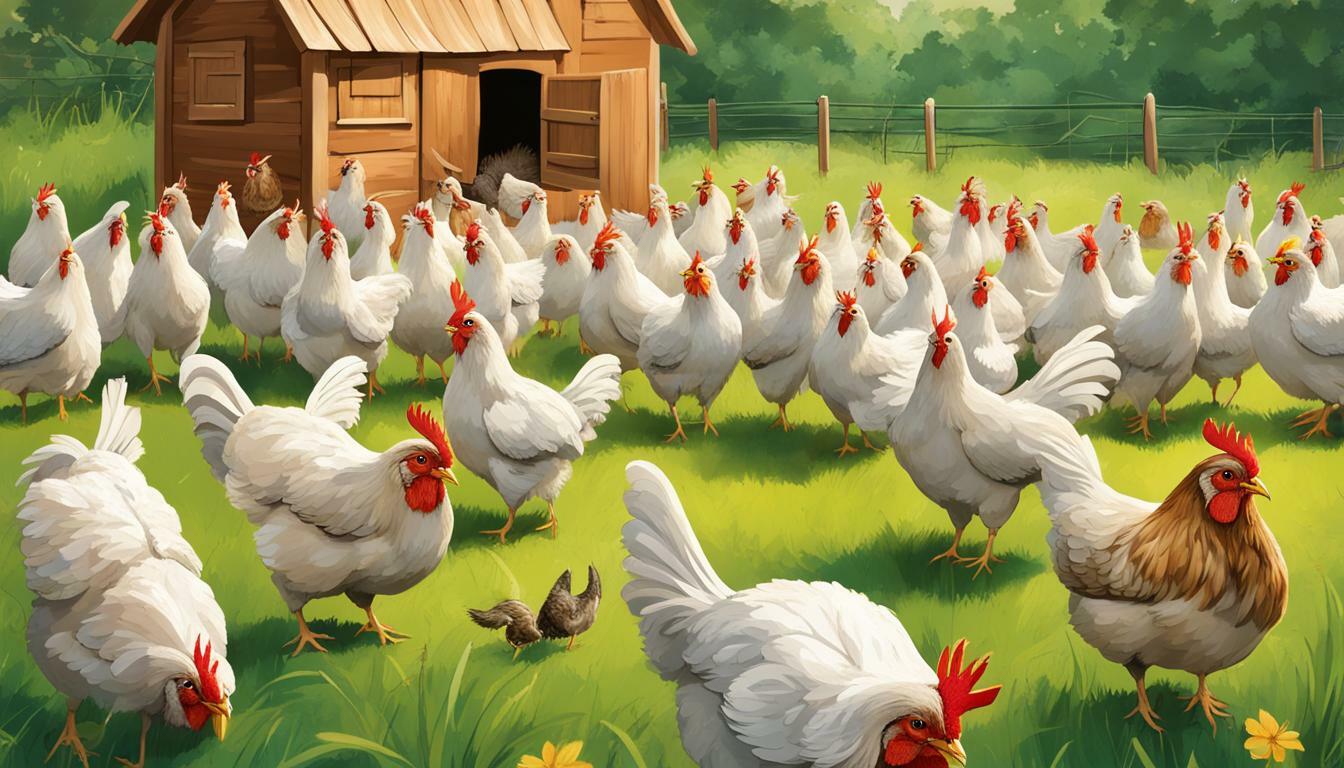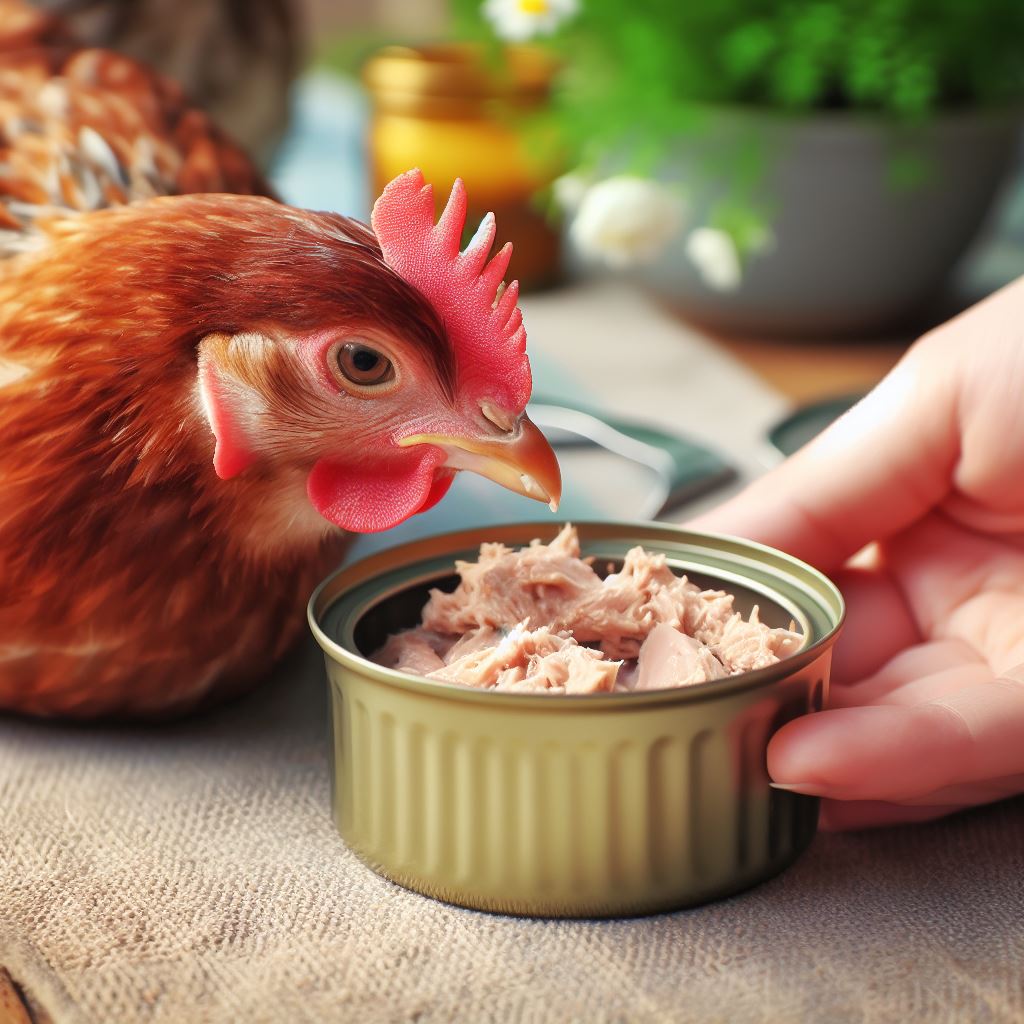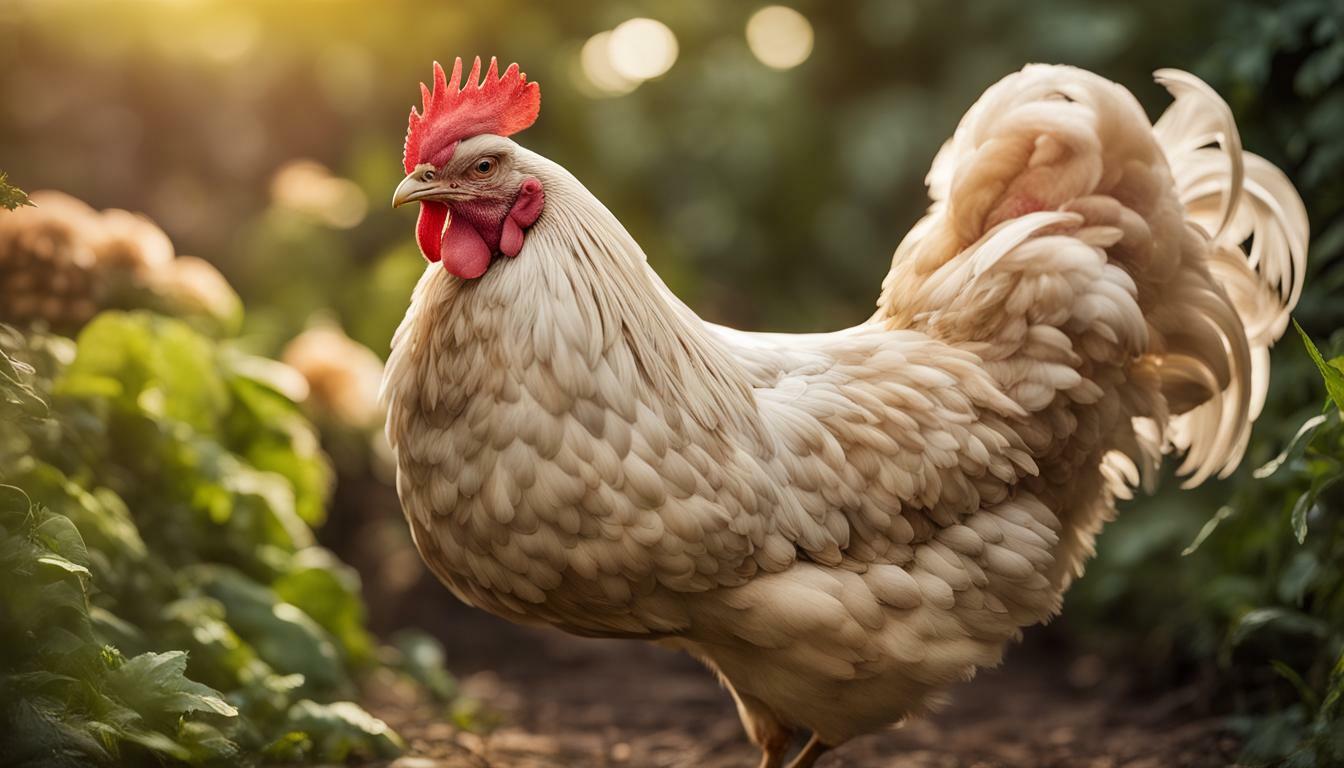Can Chickens Eat Yogurt? How Much and What Kind is Safe
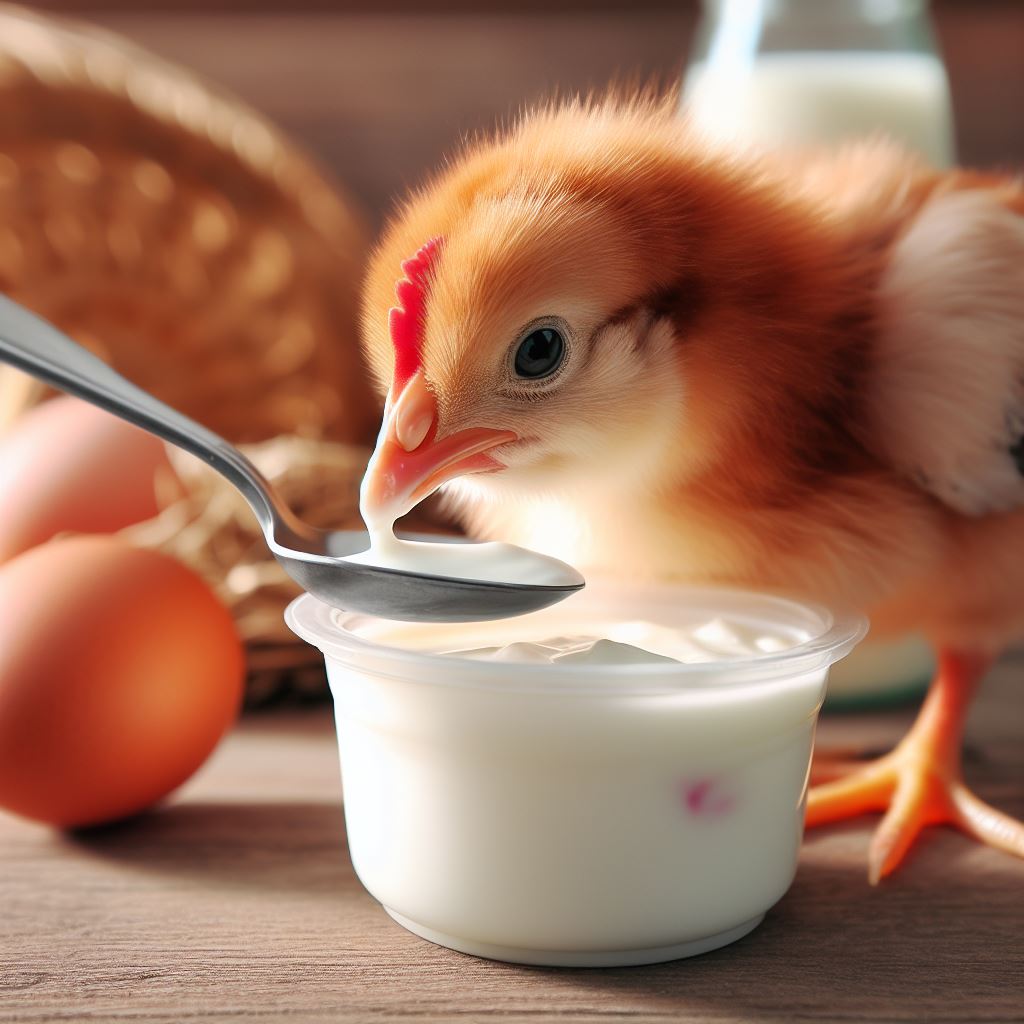
Table of content:
Yogurt can be a healthy, protein-rich treat for chickens in moderation. As with any new food, yogurt should be introduced slowly and carefully monitored to ensure your chickens tolerate it well. This comprehensive guide covers everything chicken owners need to know about feeding yogurt.
Is Yogurt Good for Chickens?
Yogurt can offer some nutritional benefits but it is high in sugar and fat compared to a chicken’s regular diet.
The main advantages of yogurt for chickens include:
- Protein – Yogurt provides an excellent source of protein from milk proteins like casein. This helps support muscle development and egg production.
- Calcium – The calcium in yogurt helps strengthen bones for healthy growth and laying.
- Probiotics – The live cultures in yogurt promote healthy gut bacteria. This improves digestion and immunity.
However, yogurt also contains:
- Lactose – Chickens don’t produce enough lactase to properly digest milk sugars. Too much can cause diarrhea.
- Fat – More fat than chickens’ regular diet which can lead to obesity and related health issues.
- Sugar – Added sugars for flavor provide empty calories and excess carbohydrates.
So while yogurt can offer some benefits, it should only be an occasional treat in limited quantities.
Can Chickens Digest Dairy?
Most adult chickens do not produce enough of the enzyme lactase to properly digest lactose sugars found in dairy products.
Lactose intolerance can cause a range of digestive issues in chickens from mild diarrhea to dehydration and malnutrition in severe cases.
When feeding yogurt, stick with low-sugar, lactose-free varieties and monitor for any diarrhea or signs of intolerance.
Some exceptions when chickens can digest dairy better include:
- Chicks under 1 week old still have enzymes to digest the lactose in yogurt for an immune boost.
- Molting chickens benefit from the protein-rich yogurt to support feather regrowth.
- Individual adult chickens may tolerate dairy products better than others. Monitor closely for reactions.
Still limit yogurt portions even in these cases and discontinue if loose droppings develop.
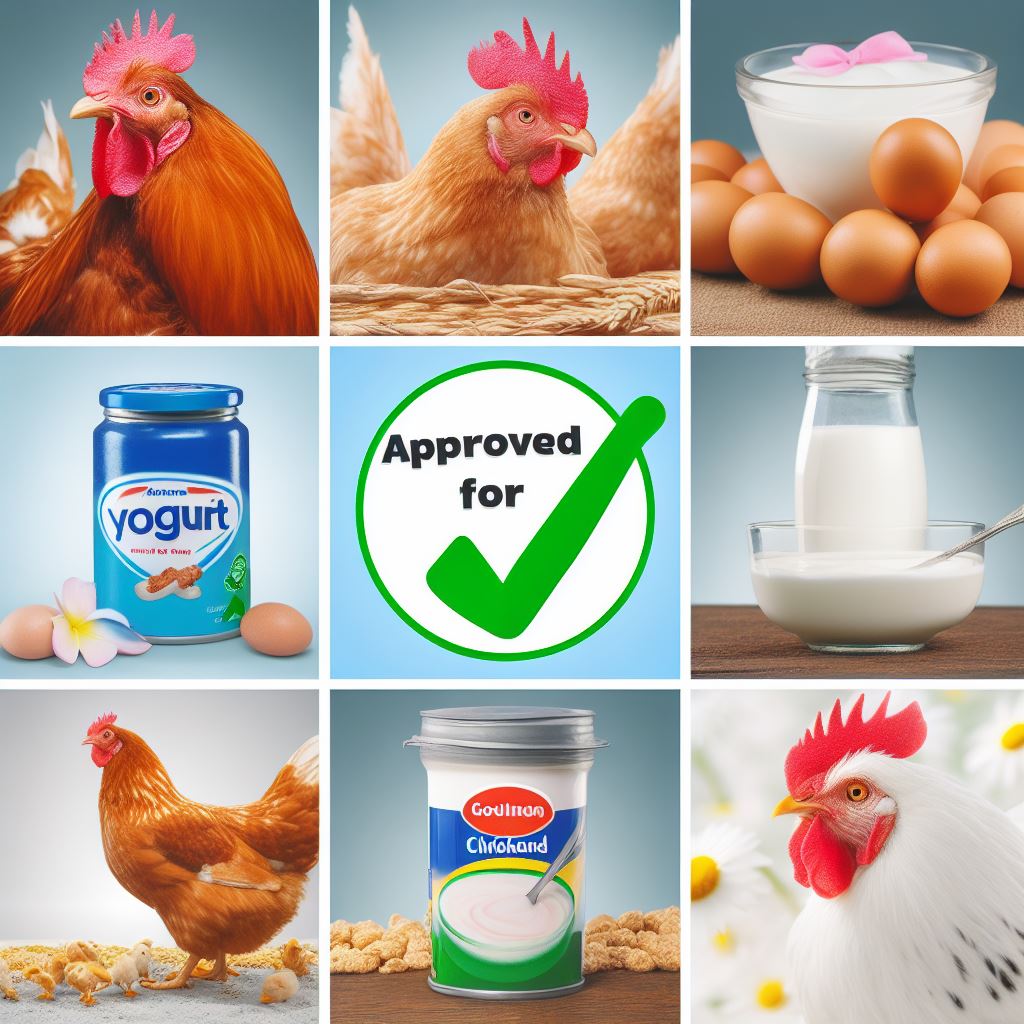 How Much Yogurt Can Chickens Eat?
How Much Yogurt Can Chickens Eat?
Yogurt should only make up a small part of a chicken’s balanced diet. Too much can lead to nutritional deficiencies, obesity, diarrhea, and other health problems.
The recommended yogurt feeding guidelines are:
- Limit treats to no more than 10% of daily calories
- Feed 1-2 tablespoons (15-30ml) yogurt per standard-sized chicken maximum
- Large breeds can have up to 1/4 cup (60ml)
- Bantam breeds should stay under 1 tablespoon (15ml)
Also limit yogurt treats to just 2-3 times per week at most. Their regular feed should still make up the bulk of their diet.
Monitor your chickens’ weight and droppings to adjust yogurt amounts as needed. Decrease or stop yogurt if loose droppings develop.
| Chicken Size | Yogurt Per Serving (Max) | Yogurt Per Week (Max) |
|---|---|---|
| Bantams | 1 Tbsp | 2-3x |
| Standard | 1-2 Tbsp | 2-3x |
| Large Breeds | 1/4 cup | 2-3x |
What Are the Best Yogurts for Chickens?
Not all yogurts are created equal when it comes to nutrition for chickens. Some tips for choosing the best yogurt options:
- Plain – Avoid added sugars and artificial flavors. Plain yogurt has more protein.
- Greek – Higher protein, less carbs, lactose, and sugar because the whey is strained out.
- Low sugar – Choose unsweetened or low sugar varieties. Aim for under 5g sugar per 6 oz serving.
- Whole milk – Provides more beneficial fat and protein than low-fat yogurts.
- Organic – Reduces risk of hormones, pesticides, and antibiotics.
- Live cultures – Probiotics improve gut health. Check for “active” or “live cultures.”
Also look out for artificial sweeteners like aspartame which can be toxic to chickens.
Some top yogurt brand picks include:
- Chobani Less Sugar Greek Yogurt
- Fage Total Greek Yogurt
- Brown Cow Cream Top Plain Yogurt
- Stonyfield Organic Whole Milk Yogurt
- Nancy’s Organic Lowfat Yogurt
Making your own homemade yogurt is also an option if you prefer total control over the ingredients.
How to Feed Yogurt to Chickens
Follow these tips for safely feeding yogurt to avoid issues:
- Introduce slowly – Start with just a teaspoon mixed into feed and gradually increase to avoid digestive upset.
- Monitor – Watch closely for signs of intestinal distress or allergic reaction when offering any new food.
- Fresh only – Yogurt spoils quickly at room temperature. Discard any uneaten portions within 1-2 hours.
- Cool first – Avoid feeding yogurt straight from the refrigerator. Allow it to reach room temperature to prevent crop temperature shock.
- Mix in – Stirring a bit of yogurt into their feed helps encourage intake and provides digestive enzymes.
- Separate – Keep chickens separated for 1-2 hours after feeding yogurt to monitor each bird’s reaction.
- Clean water – Ensure fresh, clean water is always available to help digest lactose sugars.
Discontinue or reduce yogurt if you notice any issues like diarrhea, lethargy, or other abnormal behavior.
When to Feed Yogurt to Chickens
Yogurt can provide the most benefits for chickens in these situations:
Feeding 1-2 teaspoons of yogurt in the first week after hatching can provide a probiotic boost to support immune system development.
Molting
The protein in yogurt helps fuel feather regrowth during stressful molts. Mix in 1-2 tablespoons yogurt per bird 2-3 times a week.
Heat stress
The electrolytes in yogurt can support hydration. Try frozen yogurt treats to help cool them down on hot summer days.
Digestive issues
The probiotics in yogurt can improve gut health and balance during or after illness, diarrhea, worms, etc. Consult your vet.
Elderly chickens
Higher protein needs make yogurt a useful supplement for aging chickens. Ensure proper calcium/phosphorus ratios too.
But yogurt is not necessary for most healthy, adult chickens on a balanced diet to meet their nutritional needs. Use it as an occasional treat in moderation.
Dangers of Feeding Too Much Yogurt
While nutritious in moderation, too much yogurt can cause the following problems:
- Obesity – Too many calories and fat leading to overweight chickens.
- Diarrhea – Excess lactose and sugars can disrupt digestion. Monitor stools closely.
- Nutrient imbalance – Too much yogurt displaces more complete feed sources.
- Moldy yogurt – Can cause crop infections and toxicity. Always discard uneaten portions promptly.
- Dehydration – Diarrhea from excessive yogurt can lead to dangerous dehydration. Ensure plenty of fresh water.
To keep yogurt a healthy treat, stick to the recommended 1-2 tablespoons per standard-sized chicken just 2-3 times weekly maximum. Adjust or discontinue yogurt if any signs of intolerance appear.
Frequently Asked Questions
Can chickens eat flavored yogurt?
Avoid sugary, flavored yogurts. The added sugars promote unhealthy weight gain. Stick to plain, low-sugar varieties.
What about yogurt with artificial sweeteners?
Aspartame and other artificial sweeteners can be toxic to chickens. Always check labels and avoid any with these.
Is frozen yogurt safe for chickens?
Frozen yogurt makes a nice cooling summer treat! Let it thaw to a mushy consistency that won’t cause crop impaction.
Can I feed yogurt that is past the expiration date?
No, only feed fresh yogurt. Yogurt can spoil and grow dangerous bacteria very quickly after hitting its expiration date.
Can chickens eat yogurt every day?
No, yogurt should only be an occasional treat. Too much can lead to nutritional imbalance, obesity, and other problems.
Conclusion
Yogurt can be a nutritious supplement but is high in sugar and fat compared to a chicken’s regular diet. Limit yogurt to just 1-2 tablespoons per bird, 2-3 times per week maximum.
Avoid flavored, sugary yogurts and watch closely for signs of intolerance. Discard uneaten yogurt within 1-2 hours.
When fed responsibly in moderation, yogurt can provide vitamins, minerals, protein and probiotics.
But for most healthy chickens, yogurt is an unnecessary treat, not a dietary requirement.
Chickens will benefit from the added nutrition without overdoing it on the fat and lactose.
Welcome. I’m Adreena Shanum, the proud owner of this website, and I am incredibly passionate about animals, especially poultry. I founded adreenapets.com as a labor of love, stemming from my desire to share my knowledge and experiences with poultry enthusiasts worldwide.


